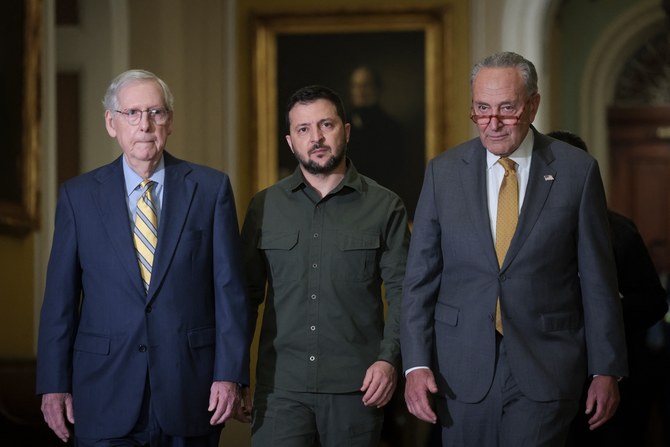
Larry Summers, the former US secretary of the treasury, last week stated in an interview: “Somebody from a developing country said to me, ‘What we get from China is an airport. What we get from the United States is a lecture.’” I had previously heard the same story from a friend in Africa about France. In the French version, they were getting a highway instead of a lecture. In essence, Summers’ warning of the US being lonely at the top is partly true. Indeed, we sometimes forget that political and security agreements often — if not always — follow economic interests. And, in recent decades, there has been a complete transformation of what we could call partnership maps.
What are these maps telling us, specifically in the Middle East and Africa? Beyond the security umbrella, what are trade and business links telling us? Going back to the Obama administration, in which Summers served as director of the National Economic Council, its foreign and security policy could be described with the slogan “pivot to Asia.” It clearly meant to move focus and resources out of the Middle East in order to address challenges in Asia, mainly China. The reality was that, in parallel, figures were showing that America’s trading interests were growing in the Pacific and diminishing in the broader Middle East and North Africa region. Such big changes take time and it was not really a visible success during Barack Obama’s time in office, but it followed economic interests.
Today, the US is no longer the largest trading partner of the countries in the Middle East. It has lost that spot to China. But it has swiftly gained more interest in Asia. Hence the need to pivot. Obviously, commercial and trade links do not apply everywhere and for everything. There are also some strategic needs for logistics and international trade routes, as well as global security. Making sure geographical zones stay stable for the greater good of the world even without economic interests. Although it is more vocal about its reluctance, this is a burden that the US is still carrying and which implies a certain level of interventionism. China does not seem to want to take on this burden and is focused on the economic side, with a clear noninterference policy that has comforted trade partners.
However, it is obvious that this security role cannot and will not continue if the US loses the top spot in too many regions. Take the example of private enterprises. They focus on the ongoing relationships with their suppliers and their customers to ensure continuity and quality. Once you change supplier or your customers change, you slowly but surely end up neglecting past ones. Countries are the same, they enhance relations and invest in them, for the benefit of their economies and their growth on international markets, to guarantee access to their companies or to access resources for their economy. Obviously, there is a necessity to keep their country safe. But ultimately, geopolitical resources are diverted when economic interests diminish.
And so, today, Asia is an important trading partner of the US, along with Europe. The interesting point is that China is still America’s largest goods trading partner and, reciprocally, the US is China’s largest trading partner. So, if this decoupling should happen, it will take time — a lot of time.
In reality, it was Richard Nixon who achieved the pivot to Asia. The US-China relationship during the Cold War proved to be one of the best moves to defeat the Soviet Union. The two superpowers are still dependent on each other and neither of them particularly likes this anymore, especially as economic competition heats up in areas such as the Middle East and Africa, where China is taking the top spot in terms of trade. On the other hand, the US became India’s biggest trading partner in 2022.
Europe, meanwhile, is linked to the US in trade. And European countries have been unable to compete with China on the economic side when it comes to the Middle East and Africa. Their divided approach is partly to blame. And here we should look closely at a potential alliance between Russia and China — one bringing the security and defense side and the other the economic aspect. As it loses ground in Africa, for example, the West no longer seems serious about its engagement. The lingering question is, does it still make sense? Is it still worth our resources? Hence, it is easier to give lectures. The result is that, today, Xi Jinping and Vladimir Putin are more popular than Joe Biden and Emmanuel Macron, both in African presidential palaces and on the streets. It is also about hearts and minds.
Today, Xi and Putin are more popular than Biden and Macron, both in African presidential palaces and on the streets.
Khaled Abou Zahr
Part of this fatigue is that the West now trades mainly with the West and it has become careless about the advance of the BRICS nations on the global arena. I will never forget a conversation I had with a tech investor in 2016, when the idea of decoupling with China started emerging. He stated that trade with China will become obsolete because advances in tech, through 3D printing, robotization, artificial intelligence, renewable energies, etc., will make the West no longer reliant on Beijing. Since 2016, the exuberance of the tech sector has been debunked, but it reflects the objectives of absolute self-sufficiency and looking inwards. One mystery is how they will get their hands on the minerals and other resources needed for their tech sector until they are able to mass produce them from a lab.
In short, what the tech investor mentioned was the reindustrialization of the West. And it is now a clear theme both on the policy side and on the investment side. COVID-19 has been a catalyst, exposing the risks of global supply chains for strategic sectors such as pharmaceuticals and food security. The impact of this reindustrialization on global trade and order is not yet clear. Nevertheless, losing too much geographically will also bring challenges and will cost the West a lot. This is something few consider when giving out lectures.
Khaled Abou Zahr is the founder of Barbicane, a space-focused investment syndication platform. He is the CEO of EurabiaMedia and editor of Al-Watan Al-Arabi.
Disclaimer: Views expressed by writers in this section are their own and do not necessarily reflect Arab News" point of view











